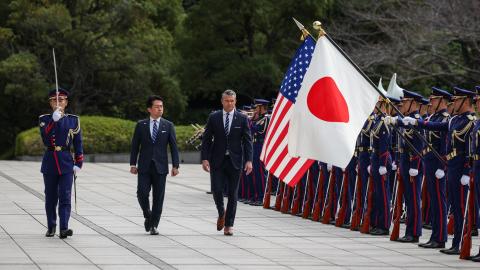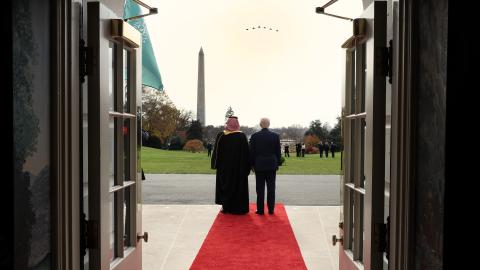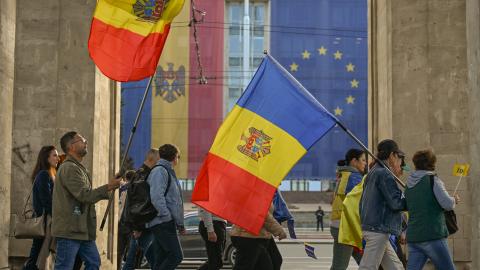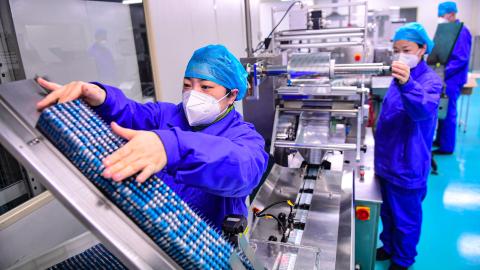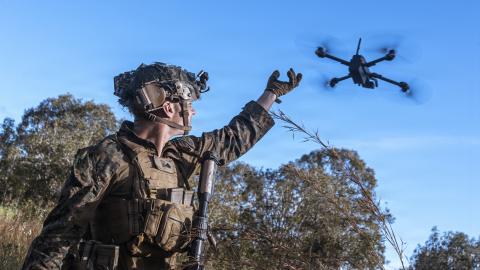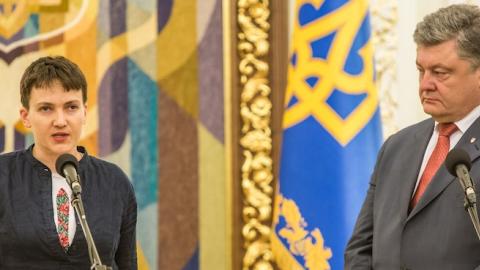__In the week since Nadiya Savchenko returned to Ukraine after her release from a Russian prison, the military pilot has shaken up her country’s political landscape. Savchenko’s controversial jailing made her a national icon for Ukraine, and she came back to a hero’s welcome — as well as to a seat in parliament, where she was voted in while incarcerated. But what’s next for this potentially powerful new force in Ukrainian politics?__
__The Cipher Brief’s Mackenzie Weinger sat down with Hudson Institute research fellow Hannah Thoburn, an expert on the country and Eastern European politics, to discuss Savchenko’s release, her potential political future, and just what Russian president Vladimir Putin may have been thinking in pardoning her.__
**The Cipher Brief: Can you bring us up to speed on who Savchenko is, and what has been her role in the Ukrainian political landscape?**
Hannah Thoburn: Nadezhda Savchenko — she’s known as Nadiya, the shortened form of Nadezhda, which essentially means “hope” — was a Ukrainian pilot, really a navigator, involved in Ukraine’s helicopter missions. She was working in eastern Ukraine when the Ukrainian army, or what semblance of it was left back in 2014, was fighting Russian invaders, Russian-backed separatists, however you’d like to term it, and she was captured while on the ground.
She was 33 when she was captured on the territory of Ukraine by Russian separatist forces. She was remanded into the custody of Russian military services who then charged her with the murder of two Russian journalists, even though there’s plenty of proof that she could not have been in the same area where those Russians were killed. She was in fact already in custody when the Russian journalists were killed.
The case they brought against her was incredibly flimsy, but she was in custody for 700+ days—nearly two years overall. And she went through a very long trial which only concluded a few months ago. During that time, she went on several hunger strikes, refusing to take food, refusing to take water. And she has been extremely outspoken, even in the courtroom, always making sure to speak Ukrainian, writing letters in Ukrainian instead of Russian, wearing Ukrainian national dress — trying to always be very proactively Ukrainian in a very anti-Ukrainian setting.
So she’s become a kind of Joan of Arc figure in Ukraine, a national hero. Particularly in a society that’s a little more on the traditional, patriarchal, very admiring of masculinity when it comes to military activity, she’s become this kind of great symbol of the new Ukrainian nation, people of all types, shapes, and sizes who are willing to fight for their country.
She was recently pardoned by Putin after she had been convicted and sentenced to 22 years in a Russian prison. One of the stories the Kremlin says is that her supposed victims’ families asked for her to be pardoned, but the reality seems to be that she was de facto exchanged for two Russian servicemen who had been captured by the Ukrainian government. Of course, the Russian government denies that they are or have ever been service members, and says they were just there in Ukraine fighting of their own will and volition, but that seems to almost certainly not be the case. So it essentially boils down to the fact it was a prisoner exchange.
Nadiya Savchenko is now back in Ukraine and has taken her seat in parliament. She was elected to parliament in absentia, on the party list of the Bloc of Yulia Tymoshenko. She’s now taken her seat, and there are a lot of questions as to whether she’s going to become a new force in Ukrainian politics.
TCB: Is Savchenko a political game changer for Ukraine?
HT: That’s the interesting question, because she’s really a firebrand. If you ever listen to her speak, she’s loud and she’s strident and she speaks with a lot of conviction and she doesn’t seem to suffer any fools. She’s straightforward. But she’s also in a position where she’s a member of a political party that is led by another woman who is of great political stature in Ukraine — a former prime minister who also spent about two years in prison when she was imprisoned by the former president Viktor Yanukovych.
So a lot of people are wondering whether Nadiya Savchenko wants to become that kind of political figure and take on some of these more established politicians like Yulia Tymoshenko or Petro Poroshenko, the current president. Does she want to take on those political powers? Does she want to perhaps create her own movement of civic-minded younger people who want to make changes in Ukraine? She hasn’t really said yet. But she has said things like, “if my country wants me to serve as president, I’m willing to.” And she does have a seat in the current parliament, so she’s going to have a political pulpit from which she can speak.
When she was speaking in the Ukrainian parliament just the other day, she said she was going to spend a lot of her time trying to get other prisoners released. So there is an open question as to whether she’s going to try and perhaps focus on the military conflict, because she’s also said, “I’d be willing to die and I’m willing to go back and fight in the east and everyone else should be too.” So is she going to focus a bit more on the military side of things? I’ve also seen some speculation that she may try and do some work on the Minsk II situation, or maybe promote a Minsk III. Because she has seen both sides of the conflict, perhaps she can have some role in that.
But whether she is going to try to turn herself into a political entity — that’s really the question.
My background is a bit more on civic engagement in Ukraine, I was a Peace Corps volunteer in Ukraine ten years ago, and it is really interesting because I see in her the kind of potential to possibly create a group of young people behind her, who are frustrated with all of the other political alternatives, and may want to look at her as the vessel through which they can finally do something, because she does have respect and admiration in the rest of the country.
TCB: Who would be part of Savchenko’s core political base?
HT: One of the things about Ukrainian politics that is both key and interesting is that since independence, political parties have not been ideological. Political parties are extensions of business interests. Many of the political parties that exist, such as Yulia Tymoshenko’s party or Petro Poroshenko’s party, are in fact basically the political organs of one particular oligarch or another.
There’s a little bit of a hope that might change, because there is one party called Samopomich, which means self reliance or self help. It’s based in the west of the country, and it seems to have more of an ideology, even though its leader [Andriy Sadovyi] is in fact very rich and owns television stations just like all of the other oligarchs do. But he is the mayor of Lviv and seems to have done a very good job there. And that party seems to have more of an ideology than most others.
So if there’s an opportunity for perhaps Savchenko to start her own party that really has an actual ideology, that might be something you see young people flock to. The question to me is whether she can do that, does she have the political power and political desire to do that? We’ll see.
We’re just a few days out here. Vaclav Havel, a dissident in then Czechoslovakia, had been a political prisoner in his own country. But when he was released, he was already a national figure, a symbol, and then he was able to turn that into something greater, eventually being elected as the country’s President. Whether that is something Nadiya Savchenko is interested in doing, we still don’t really know.
I can see her appeal to many Ukrainians who have family members in the military, or know someone who is serving, was injured, or died serving. It’s a very real conflict to people, very present in their everyday lives. We’ll see what she does, because there are no elections coming up anytime soon unless the parliament falls apart and there’s new parliamentary elections. The next shot for her to be president is in two and a half years or so. So she’d have to use this time to build up that base, to come up with a political platform, unless she wants to align herself with one of these oligarchic interests — which I don’t think she does, because she’s also made remarks about how she spent two years in prison, came back, and nothing had changed. She clearly wants to see change.
It will be interesting to see whether she aligns herself with one of the current parties, forms her own party that has an ideology behind it, or forms her own party that is connected to an oligarch.
**TCB: What was Putin’s political strategy with pardoning Savchenko? Beyond a prisoner exchange, what else was going on in Putin’s mind?**
HT: There’s a lot of debate about that. I do think it’s interesting to note that the time for the renewal of sanctions is approaching. Every six months the sanctions on Russia need to be renewed. And making a gesture like the prisoner exchange may have perhaps been done in the hopes it would be enough to try and sway one of the 28 European countries to say, “no, we’re not going to renew sanctions.” All it takes is one, essentially, and you’re already seeing some cracks within the unified sanctions wall. Giving those sanctions sceptics something to latch onto may in fact be very useful for Putin.
The other possibility, and I think you’ve seen German Foreign Minister Frank-Walter Steinmeier say something to this effect, is that the exchange created trust and will “help build” more trust between the Russians and the Ukrainians, as well as the Germans and the French, who are all involved in the implementation of the Minsk II agreement. So it’s a very small intermediate step in pushing both the Ukrainians and the Russians — if they can get this small thing done, then perhaps we can start moving again on the road to implementation of Minsk.
**TCB: For U.S. national security professionals, are there any things that you think should be brought up, or in the wake of the Savchenko release that maybe they’re not paying attention to right now but should be? Is there anything that has been ignored or misconstrued for those in the U.S.?**
HT: I’m biased because this is the region I study, but it does bother me a little bit that I don’t think people see the linkages between Russia’s involvement in Syria and Russia’s involvement in Ukraine very clearly. I am rather frustrated by what I see as this kind of Western, European, American tendency to want to—particularly now that the NATO summit in Warsaw is coming up—to divide the two NATO flanks into eastern and southern, where Italians don’t think what happens in the east is pertinent to them, and Poles and Estonians don’t think what happens in the Mediterranean is of importance to them. I do think that Russia’s involvement, both in the Mediterranean and the East, and the linkages between the two, are actually very interesting and very important, and not enough people have really looked at what I see as this coming together of these two fronts.
One interesting little tidbit is that when Savchenko landed at the airport in Kiev and people went to greet her, she refused to take flowers from Yulia Tymoshenko, and she is a member of her party. She shook her hand, but refused to take flowers from her. And that was seen by a lot of people as a signal that even within that party there is going to be a lot of fighting, that perhaps Savchenko was concerned that Yulia Tymoshenko was going to try and use her as a political symbol to augment her own power at the expense of Nadiya’s reputation. She’s politically savvy enough to know that may be a possibility.
The other interesting thing is that when there was a little ceremony with the president, she didn’t thank him. Of course it’s intentional. She purposefully never said thank you, and she talked about the other prisoners who were still there in Russia. She seems very concerned about being used as a political tool by either the government that helped get her released or the political party that she’s a member of. And it seems, at least on the surface, that she’s very aware that’s a possibility and wants to nip that in the bud and say, “I’m my own person, I stand alone, I owe nothing to anybody here.”
